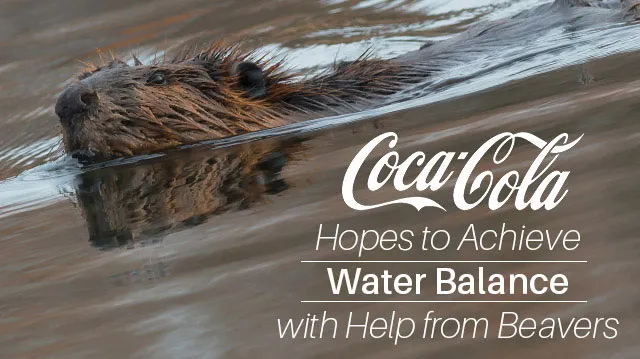Beavers and Coca-Cola may seem like a strange combination, but as it turns out, the dam-building animals may help the beverage company meet their water replenishment goals by 2020.
With 40 billion gallons of drinks produced annually across the globe, and an additional 41 billion gallons of water used in production, Coca-Cola did the responsible thing and launched a program to improve water conditions and replenish local areas with water.
In 2007, Coca-Cola announced its goal to return water to communities around the world equal to the amount used in the production of its beverages — over 80 billion gallons. The company stated that between 2005 and 2014, it, “balanced an estimated 94 percent of the water used in our finished beverages based on 2014 sales volume, for a total of 153.6 billion liters of water replenished to communities and nature.” For those keeping count, that’s about 40.58 billion gallons. Now it is pushing to offset the water used and discarded through production.
To achieve what it calls “water balance” Coca-Cola is investigating new ways to help the environment through its diverse conservation and restoration projects. Among these projects, the company has invested in beavers as a way to restore groundwater, according to a recent Take Part article. But why beavers?
Beavers and the environment
A University of Connecticut study titled “The River Discontinuum: Applying Beaver Modifications to Baseline Conditions for Restoration of Forested Headwaters,” analysed the diversity of river systems that included beaver populations.
“One beaver impoundment alone can exceed 1000 meters along the river, flood the valley laterally, and fundamentally alter biogeochemical cycles and ecological structures,” wrote the authors of the study. When beavers build dams, water floods the land around rivers. This allows water to seep into the ground where it wouldn’t normally have the chance.

Beavers represent an ecologically-friendly alternative to construction equipment as a means for replacing groundwater. It’s great to see Coca-Cola investing in natural solutions to a problem that they created in the first place. Other points in the company’s water strategy include improving water use efficiency, mitigating water risk, and treating and recycling its wastewater.
Five negative effects of groundwater depletion
According to the Groundwater Foundation, the overuse and depletion of groundwater leads to five significant effects:
- Lowered water table: The underground water table is often lowered through excessive pumping. This can drastically affect wells and spell disaster for communities that rely heavily on well water for survival.
- Increased costs: When the water table lowers, pumps must push farther into the earth to reach water, leading to higher costs for companies.
- Reduced surface water: As groundwater is depleted, surface water is also reduced. Changes to one affect the other.
- Land subsidence: The land subsides when underground support is lost through human activities, like over pumping. This can lead to a collapse in the soil or sinkholes.
- Water quality decreases: In coastal areas, saltwater can be pulled inland and upward through excessive groundwater pumping. This can contaminate water supplies and negatively affect local wildlife and plant life.
Although we may not be the biggest fans of soft drinks, we can’t help but give Coca-Cola props for doing the right thing as far as our planet is concerned. We’re excited to learn more about the beaver project as it gets underway.
Do you have thoughts on the use of beavers for ecological restoration?
—Megan Winkler
Megan Winkler is an author, historian, Neurosculpting® meditation coach, certified nutritional consultant and DIY diva. When she’s not writing or teaching a class, Megan can be found in the water, on a yoga mat, learning a new instrument or singing karaoke. Her passion for a healthy mind-body-spirit relationship motivates her to explore all the natural world has to offer.
Sources:
https://www.takepart.com/article/2015/09/23/coca-cola-using-beavers-increase-water-supply
http://digitalcommons.uconn.edu/cgi/viewcontent.cgi?article=1000&context=geosci
http://www.groundwater.org/get-informed/groundwater/overuse.html
